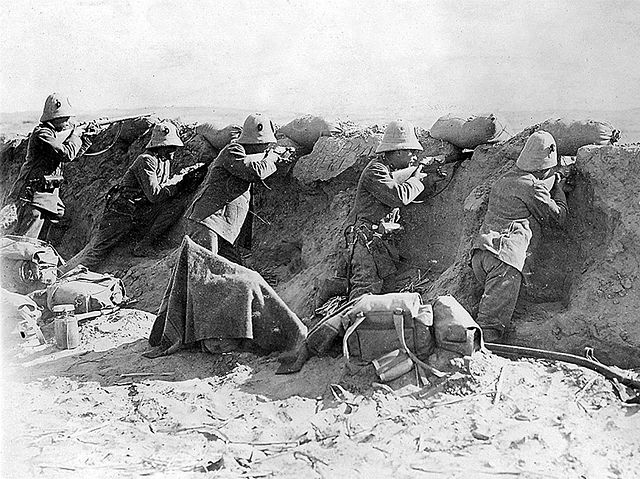The Italo-Turkish or Turco-Italian War was fought between the Kingdom of Italy and the Ottoman Empire from 29 September 1911, to 18 October 1912. As a result of this conflict, Italy captured the Ottoman Tripolitania Vilayet, of which the main sub-provinces were Fezzan, Cyrenaica, and Tripoli itself. These territories became the colonies of Italian Tripolitania and Cyrenaica, which would later merge into Italian Libya.
Clockwise from top left: Battery of Italian 149/23 cannons; Mustafa Kemal with an Ottoman officer and Libyan mujahideen; Italian troops landing in Tripoli; an Italian Blériot aircraft; Ottoman gunboat Bafra sinking at Al Qunfudhah; Ottoman prisoners in Rhodes.
Italian Prime Minister Giovanni Giolitti, 1905
Italian dirigibles bomb Turkish positions on Libyan territory. The Italo-Turkish War was the first in history to feature aerial bombardment by airplanes and airships.
Ismail Enver Bey in Cyrenaica, 1911.
The Italian colonial empire, also known as the Italian Empire between 1936 and 1941, was founded in Africa in the 19th century and it comprised the colonies, protectorates, concessions and dependencies of the Kingdom of Italy. In Africa, the colonial empire included the territories of present-day Libya, Eritrea, Somalia and Ethiopia ; outside Africa, Italy possessed the Dodecanese Islands, Albania and also had a concession in Tianjin, China.
Francesco Crispi promoted Italian colonialism in Africa in the late 1800s.
Italian possessions and spheres of influence in the Horn of Africa in 1896
Italian troops during the Italo-Turkish War, 1911.
The flag of Italy shown hanging alongside an Albanian flag from the balcony of the Italian prefecture in Vlorë, Albania during World War I








